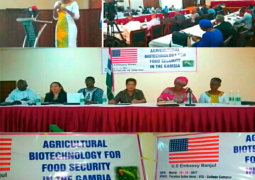
The meeting was hosted by the Planning Services Unit under the Ministry of Agriculture and funded by CILSS, UEMOA, ECOWAS and partners.
It was organised within the framework of the operations of the regional food crisis prevention and management in the Sahel and West Africa (PREGEC) programme.
In his remarks closing the meeting, the head of the Planning Services Unit, Abba Sankareh, said this annual meeting of countries constitutes an essential instrument of dialogue in support of people faced with risks of food insecurity, with a view to discussing mitigation measures for a possible food crisis.
Therefore, he added, through this dialogue, the perfection and improvement of specific performance criteria of the regional system for monitoring, and a harmonized framework for the identification and analysis of risk areas and vulnerable groups are, therefore, necessary because of the quality and their importance as instruments for preventing and responding to food insecurity.
He said there is room to improve our information systems which still remain very relevant, adding that certain information/data collected are not always conducive to produce the expected results.
“Therefore, we must seek to establish an agricultural statistics or data system according to country priorities, wherein the relevance of opinion is closely linked to the quality of data,” Mr Sankareh added.
According to Sankareh, there is the need to further work on a system of analysis, strengthen technical support to countries that integrates the new device in collecting methodology, analysis, statistical data processing while ensuring constant upgrading of national accounts given the mobility of staff in our governments and the evolution of technology and knowledge, among others.
He expressed hope that in the very near future, all 17 countries of the CILSS/ECOWAS would work with the harmonized framework without any difficulties.
He further noted that this strengthening of country capacity is closely related to their consolidation of CILSS as an institution, so that it would fulfil its mandate.
He thanked their development partners, especially USAID and the European Union for their continued and multi-faceted support in the continuous monitoring of the food and nutrition situation in the Sahel and West Africa.
He also expressed gratitude to their technical partners FAO, FEWS NET, WFP, ECHO, and OCHA for their regular participation in the activities of CILSS.



